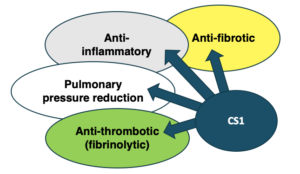
FDA grants Cereno Scientific’s lead candidate Orphan Drug Designation
Cereno Scientific is accelerating the building of a platform of drug candidates in epigenetic modulation, by HDAC inhibition, for cardiovascular and rare diseases. On March 10, the company’s main candidate CS1 was approved for Orphan Drug Designation by the FDA for the treatment of Pulmonary Arterial Hypertension.
On Tuesday March 10th, it was announced that Cereno Scientific has received Orphan Drug Designation (ODD) for its lead candidate CS1 for the treatment of Pulmonary Arterial Hypertension (PAH) from the US Food and Drug Administration (FDA). The achieved ODD is a direct result of the company´s expanded focus towards the potential of CS1 for epigenetic modulation, leading them to identify rare diseases with unmet medical needs where CS1’s effects matches several aspects of the respective disease pathogenesis.
CS1 is a novel formulation of valproic acid (VPA), a substance that has been used to treat epilepsy for decades. So far, Cereno Scientific has advanced CS1 within cardiovascular diseases, primarily as an anti-thrombotic candidate, based on preclinical, clinical as well as epidemiological research supporting that CS1 may be able to reduce the risk of cardiovascular thrombotic events e.g. stroke, myocardial infarction and venous thromboembolism. Along these lines, a phase II clinical trial has been approved to evaluate the compound’s potential in thrombosis prevention.
CS1’s potential within epigenetic modulation for cardiovascular disease

Last spring, however, the company’s scientific advisory board called attention to the accumulating scientific documentation, highlighting that the active substance in CS1, VPA, – being an HDAC (Histone DeACetylase) inhibitor and hence acting as an epigenetic modulator – had anti-inflammatory, anti-fibrotic and pressure-relieving characteristics in addition to its anti-thrombotic properties. This widened therapeutic profile of CS1 could be useful for a broader spectrum of cardiovascular diseases, including some rare diseases.
It prompted the company to not only start a search for new indications that matched this new profile but also an intensive development work in search for new chemical entities to create a therapeutic platform for epigenetic modulation of cardiovascular disease with HDAC inhibition.
Since then, Cereno Scientific has been building a pipeline of drug candidates that, through epigenetic modulation of cardiovascular and rare diseases, could meet significant clinical needs.
PAH – Cereno Scientific’s first Orphan Drug Designation
The Orphan Drug Designation by the FDA allows for Cereno Scientific to pursue investments into a development program for CS1 in PAH – a progressive fatal disease with poor quality of life and no curative treatment except for lung transplantation, which for the majority of patients is not available in time. Instead, current standard treatment consists of various drugs that have limited efficacy and often have to be combined with each other to reach acceptable treatment outcomes. Supportive care, e.g. heart failure therapy, is also common as heart failure is usually the ultimate end stage of the disease.
The PAH disease is characterized by high blood pressure in the arteries that go from the heart to the lungs due to pathological changes in the lung vessels. With PAH, the arteries in the lung narrow, and are eventually blocked. Inflammation, fibrosis and ultimately local thrombosis formation is part of the disease progression. As it becomes harder for the blood to flow through the arteries, the blood pressure in the lung increases successively. This, in turn, causes the heart to work harder, and, with time, the heart muscle weakens which could eventually lead to heart failure.
The cause of PAH is often unknown and without curative treatment for most patients, the disease is associated with a high mortality rate. Thus, there is a high unmet medical need for better treatment alternatives and CS1, with its multidimensional mechanistic approach, has the potential to improve the treatment of the disease.

Benefits associated with ODD
Being a rare disease with such a significant unmet medical need means that new innovative therapies with a deemed potential to improve the treatment for patients with PAH might be able to obtain the ODD status. The ODD comes with several benefits for the company developing such promising drug candidates which, all in all, could result in a faster and simpler path to market approval and launch.
The ODD associated benefits include adapted regulatory requirements, e.g. the Fast Track procedure and lower demands for patient inclusion in clinical studies which, in turn, leads to quicker and less costly clinical development programs. ODD is also associated with tax credits, lower regulatory fees and market exclusivity for 7 years in the US, subject to future market approval from the FDA. In addition, orphan drugs are often granted a beneficial price premium once launched.
Cereno Scientific’s CEO Sten R. Sörensen commented on FDA’s ODD ruling in a press release:
»We are very pleased that the FDA has granted orphan drug designation to our HDAC inhibitor CS1, which allows us to implement a clinical development program on the rare and serious disease PAH aiming to help a broader group of patients, that now includes patients with rare diseases, with our lead compound CS1. Our focus to develop drug candidates that effects epigenetic modulation, stems from our commitment at Cereno Scientific to help patients with cardiovascular related diseases.«
Read more about ODD: The Success of Orphan Drug Designation (14 October 2019)
Added asset with significant potential
With the ODD, Cereno Scientific gains a substantial asset in its pipeline. As of today, the company’s portfolio consists of CS1 aimed for thrombosis prevention and now also with expanded indication in PAH, and two preclinical candidate programs acquired in 2019 – CS014 and CS036.
In terms of market potential – and the resulting core value of the company – the ODD introduces significant opportunities. The global PAH market is expected to reach $9.3 billion by 2026 as the market’s projected compound annual growth rate has been estimated at 5.6% between 2019 and 2026, chiefly driven by the trend towards combination therapy. The adoption of combination regimens in treating PAH presents a clear opportunity for Cereno Scientific’s lead candidate.
CS1 could capture a significant PAH market share thanks to its unique set of properties compared to standard treatment. This indicates CS1’s substantial potential given the frequent premium pricing of marketed orphan drugs. Recent licensing deals only confirm this observation, highlighted for instance by United Therapeutics and Arena Pharmaceuticals’ agreement for Arena’s phase III candidate ralinepag in 2018, boasting a total deal value of $1.2 billion and an upfront payment of $800 million.
By broadening the indication for CS1, Cereno Scientific has substantially increased the value of its portfolio.
The content of BioStock’s news and analyses is independent but the work of BioStock is to a certain degree financed by life science companies. The above article concerns a company from which BioStock has received financing.


